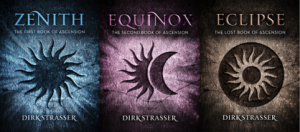The Books of Ascension Trilogy
by Dirk Strasser
Momentum
Review by Alex Stevenson
Originally published in 1993, Dirk Strasser’s Zenith: The First Book of Ascension is a sadly overlooked landmark in Australian fantasy fiction. While tremendously popular with those who read it, Zenith arrived at a time before the mainstream acceptance of Australian fantasy. Similarly, its excellent sequel Equinox was also underappreciated, while the third and final volume of the trilogy, Eclipse, has until now, never received publication in English.
Fortunately, this injustice has now been righted. Republished in full, Strasser’s Ascension Trilogy is once more available, and sure to enchant a new generation of fantasy lovers and thrill existing fans.
Set on the Mountain, a globe-spanning peak that encompasses the world, the trilogy follows young Atreu the Ascender on his quest to reach the summit of the mountain and experience Zenith, a sort of spiritual awakening and enlightenment. Atreu’s ascent is not uncontested, however. Forces both misunderstood and malign work against him, and only by harnessing the unique truth of his Zenith can he hope to prevail.
Strasser’s blend of adventure, esotericism, Eastern mysticism, and fantasy makes for compelling reading, and the apparent simplicity of Atreu’s task belies its implications. Cleverly escalating conflict pulls Atreu and the narrative along at consummate pace, and as the stakes build, so too does the tension.
Strasser is to be commended for the consistency of his work. Each book is as exciting and engaging as the last, and the often disappointing ‘middle-book syndrome’, which so often plagues trilogies, is nowhere to be seen. Indeed, there is a tremendously satisfying logic in the way Strasser has ordered the narrative, and it would be hard to resist a second reading given the depth of foreshadowing, prophecy and hard-earned revelation within the text.
The influence of Eastern, particularly Tibetan, mysticism is strong in the work, but is absorbed so thoroughly into the mythology of Strasser’s world that there is no hint of contrivance or artifice. Atreu’s journey is as much a divine pilgrimage as it is traditional quest.
Perhaps it is this transcendent influence, or perhaps it is the author’s art, but the story of the Mountain is infused with something of the timeless epic. As its plot grows, twists, and turns around on itself, there is the feeling of something much more powerful than the narrative at work.
With all three titles now available, it behoves all fans of the genre to take note. Strasser’s riveting prose has not aged a day, and this grand tale of adventure and enlightenment is as eminently readable now as when it was first published.

